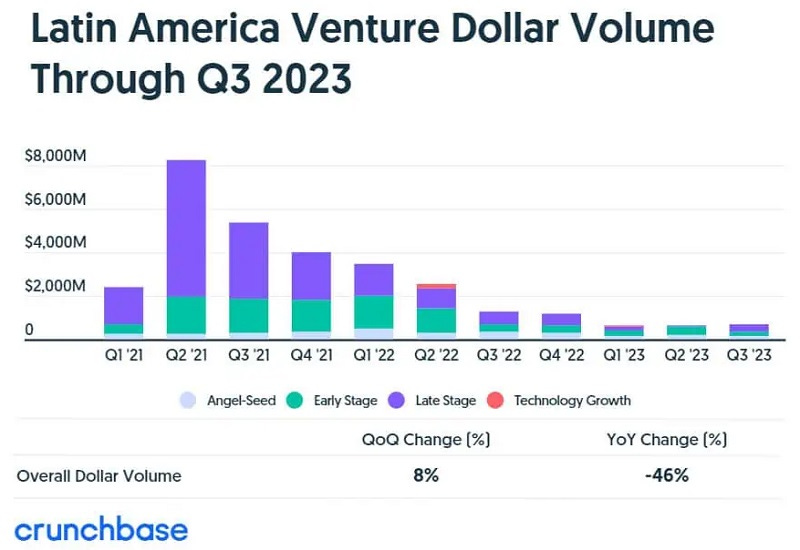Corporate Venture Capital boosts the Brazilian startup ecosystem
The rise of illegal fintechs that defraud users in LatAm. LatAm's higher education transformation. Clara launches payment account in Brazil. Miami based companies are looking for LatAm startups.
Welcome to our weekly newsletter covering the latest news and trends in the Latin American startup scene.
Corporate Venture Capital boosts the Brazilian startup ecosystem with R $10 billion investment
Brazilian startups have raised over R $10 billion in investments from Corporate Venture Capital (CVC), marking a resurgence after a period of economic adjustment.
Global investments in CVC have more than doubled in 2021, reaching a record-breaking USD $169 billion. Brazil accounts for half of all CVC activity in Latin America, with an estimated USD $10 billion allocated to domestic startups.
The Brazilian Association of Corporate Venture Capital (ABCVC) has been created to support the growth of the CVC ecosystem and promote innovation. Investments in startups not only drive their growth but also revitalize the overall business market.
Vía Contxto
Fintech face the challenge of protecting users in LATAM
Colombian fintech company RapiCredit has secured a USD$7 million debt investment from U.S. fund Almavest. RapiCredit provides microcredits to individuals without access to banking services, and has helped over 550,000 unbanked Colombians enter the traditional financial system.
Similar fintech companies have emerged in Latin America, offering loans and credit cards to those excluded by traditional banks. Nu Bank and Stori are examples of successful startups in the region, with Nu Mexico recently applying to become a bank.
However, the success of these fintech startups has also led to the rise of illegal "ghost" companies that defraud users through attractive but harmful products. Authorities need to legislate and regulate these applications to protect users from fraud and cybercrimes.
Vía Contxto
Harnessing Technology for Educational Excellence and Global Competence in Latin America
Latin America is undergoing a transformation in higher education, fueled by the integration of technology. Each country in the region has its own unique approach to incorporating technology into education, addressing challenges like the digital divide and social inequalities.
Brazil is expanding online education and focusing on STEM. Chile is enhancing digital infrastructure and aligning digital skill development with market demands. Argentina is addressing the digital divide and integrating e-learning platforms. Colombia is expanding online courses and incorporating digital tools in classrooms. Technology in education is preparing students for the global market and cultivating soft skills. However, challenges remain, such as disparities in technology access and the credibility of online education. The Finnish model of technology integration in education offers a successful example, emphasizing equal access to technology and equipping students with essential skills.
The future of higher education in Latin America relies on investment in digital infrastructure and collaborations between institutions and technology companies. Overall, integrating technology in higher education in Latin America has the potential to empower the next generation of professionals in a digitally-driven world.
Vía Higher Education Digest
Quick News
ACI Worldwide and Mexipay join forces to transform payments in Mexico
ACI Worldwide, a global leader in real-time payment software, has partnered with Mexican fintech company Mexipay to drive innovation in payments in Mexico.
About the partnership. Mexipay will use ACI's payment platform to introduce ISO 20022 real-time payments and other innovative payment services in the country.
Why it matters. Mexipay's new payment technology, expected to be operational in early 2024, will complement Mexico's existing real-time capabilities and provide access to underserved banks and industries. (Contxto)
Tec de Monterrey and German Cooperation launch initiative to support climate startups in LatAm
Tecnológico de Monterrey, along with the German Cooperation for Sustainable Development and EIT Climate-KIC, has launched an initiative called CATAL1.5°T to support startups in Latin America that are developing solutions to address climate change.
About the program. The program aims to identify and support 10 startups that are committed to reducing greenhouse gas emissions and promoting gender equity. Selected startups will receive funding of up to € $100,000 and participate in a 5-month training program.
Save the date. The deadline to apply is December 15th. (Contxto)
Robo-advisory market to reach a value of USD$4,480 million
The Latin American robo-advisory market is projected to grow at a CAGR of 53.68% and reach a value of USD$4.480 billion by 2023. The increase in robo-advisors in Latin America has led to more people getting involved in investment activities.
Brazil: Land of opportunities. Brazil is highlighted as a significant economy in the region, offering opportunities for wealth management companies.
Growth drivers. Key growth drivers include offering investment products to new investors, linguistic cohesion, and providing accessible private banking services.
Key players. Key players in the market include Betterment LLC, Wealthfront, Personal Capital, FutureAdvisor, and Charles Schwab Corporation. (Contxto)
Mexican unicorn Clara launches payment account in Brazil
Latin American Fintech company Clara has introduced a payment account in Brazil to expand its product range.
Value proposition. The account will offer various payment methods, aiming to facilitate transactions worth BRL$6.000 billion by 2024.
Clara’s growth plans. Clara plans to double its customer base in Brazil next year and aims to gain a significant share in the B2B payment market. The company also intends to offer deposits through Brazil's instant payment system, PIX, in the future. (Contxto)
Cemex Ventures, the venture capital unit of Cemex, has made a strategic investment in French startup Vizcab.
Vizba’s business model. Vizcab has developed a digital platform that calculates the carbon footprint of buildings throughout their lifecycle, helping professionals in the construction industry make more sustainable choices.
Highlights. The investment aligns with Cemex Ventures' commitment to sustainable construction and supports stricter environmental regulations.(Contxto)
Tiendanube presents results of El Buen Fin 2023: online sales increase by 110%
The thirteenth edition of El Buen Fin, the biggest sales campaign in Mexico, saw a 35% increase in participation from cloud stores
Highlights. Sales during the campaign increased by 54% compared to the previous year. El Buen Fin 2023 outperformed other campaigns, with a 67% increase in sales compared to Hot Sale 2023.
Product categories & states sales breakdown. The most popular product categories were Health and Beauty, Fashion, Pets, and Toys. Mexico City, Jalisco, Nuevo León, State of Mexico, and Veracruz were the leading states in terms of billing and sales. (Contxto)
Gamescom Latam to boost Latin America’s gaming ecosystem
Gamescom Latam, a new gaming event in Latin America, has been announced through a collaboration between Gamescom and BIG Festival.
About the event. Gamescom Latam combines the global prominence of Gamescom with the regional influence of BIG Festival, creating a platform for business and launches in the region. BIG Festival will continue as an independent initiative but will be a part of Gamescom Latam, showcasing the best independent games globally.
Save the date. The event will take place in São Paulo, Brazil, from June 26 to June 30, 2024, and aims to provide an immersive gaming experience for fans and industry professionals. (Contxto)
FedEx contributed USD $13 billion to the transportation and storage sector in America during 2023
In fiscal year 2023, FedEx faced challenges due to inflation, interest rates, and a slowdown in global trade. However, the company quickly adapted by aligning its cost base with demand and building a more flexible and efficient network.
The crucial role in LatAm. Despite the economic difficulties, FedEx continued to play a crucial role in Latin America and the Caribbean (LAC) region. In LAC, FedEx has expanded its presence and improved connectivity through investments in facilities and infrastructure.
The case of Colombia. For example, in Colombia, FedEx ensures the timely delivery of perishable products like flowers to the US. In the Americas, FedEx contributed 2.1% to the net economic product in the transportation sector and indirectly contributed USD$13 billion to the region's financial product. (Contxto)
IDB in Miami: U.S. business can think bigger about Latin America and the Caribbean
The Inter-American Development Bank (IDB) is launching a project called Bid for the Americas to encourage US companies to explore business opportunities in Latin America and the Caribbean.
Value proposition. The IDB is creating online platforms to generate more opportunities for large projects and address the information gap that has been a barrier in the past.
Why it matters for LatAm. The IDB helps fund USD$5 billion in business procurement contracts in Latin America and the Caribbean, and Florida is well-positioned to benefit from this. (WLRN)
The Automotive Future is Electric and Mexico can Capitalize on It
The shift towards electromobility and EV manufacturing in Mexico's automotive industry is gaining momentum, despite infrastructure limitations.
Mexico’s advantage. The country is well-positioned for the transition, with a diverse product offering, competitive prices, and ample residential charging infrastructure.
Mexico’s disadvantages. However, challenges such as training a specialized workforce, adapting infrastructure, and addressing battery pollution need to be overcome. (Mexico Business News)
The Emergence of Multinationals in Latin America
Latin America has become a promising market for enterprises and startups, with a growing population of digital buyers.
Notable startups. Entrepreneur Magazine featured several companies expanding in the region, including Prezent, a platform for business presentations, Foothold, a real estate crowdfunding platform, 10Pearls, a global digital transformation company, Crescite, a blockchain-based community, and Finsocial, a Colombian fintech.
Highlights. These companies are capitalizing on the opportunities in Latin America and expanding their presence in the region. (Latin America Reports)
Finds
tools, websites, and accessories
ChatGPT Chrome Extension. The ChatGPT Chrome Extension offers a range of features to enhance productivity. It provides instant access to ChatGPT on every webpage, allowing users to chat, summarize webpages, and execute AI commands.
CommandBar. CommandBar provides AI-powered user assistance for product, marketing, and customer teams. It offers features like an AI assistant called Copilot, product tours, in-app feedback surveys, self-guided onboarding checklists, rich help documentation, and a search tool called Spotlight.
Hypertype. AI email assistant: One-click solution for drafting email replies by extracting relevant information from your emails, PDFs, Excel sheets, and knowledge base.
Food for Thought
Growth lessons beyond classic PLG
In this article, Sri Batchu, former Head of Growth at Ramp, shares his insights on building a successful growth function. He discusses the unique challenges of growth in a product category that is not traditionally product-led growth (PLG) friendly and emphasizes the importance of finding the right balance of growth metrics.
Sri also highlights the value of bringing product, data, and engineering resources to improve sales team efficiency. He emphasizes the need for velocity and short cycle times in all teams and provides tips for avoiding burnout. Sri also discusses the importance of learning from failures and highlights the key qualities he looks for in growth team members.
Lastly, he encourages software founders and executives to think beyond the traditional definition of PLG and explore creative ways to leverage technology and product for acquisition, retention, and expansion. (Kyle Poyar’s Growth Unhinged)Lessons from going freemium: a decision that broke our business
Lenny shares the story of Bobby Pinero, CEO of Equals, and how adding a freemium plan nearly destroyed his business. Bobby explains that while the initial launch of Equals was successful, they started receiving complaints about their onboarding process, leading them to consider adding a freemium option.
However, after implementing a free plan and reducing onboarding friction, they experienced a surge in users initially but struggled to retain them in the long term.
The article highlights the lessons they learned, including the importance of engagement, retention, and revenue, as well as the impact of onboarding friction. Ultimately, freemium didn't work for Equals, but the hope is that others can learn from their experience. (Lenny’s Newsletter)Marc Randolph, former Netflix CEO discusses the surprising benefits of starting from scratch rather than being a large and established company.
Marc gives examples of how new companies with modern equipment and fresh ideas can outperform older, more experienced competitors. They highlight the importance of not being held back by outdated products, code bases, or distribution models.
The essay advises market leaders to periodically reassess their weaknesses and for startups to take advantage of their competitors' limitations. Ultimately, the key is to focus on meeting the needs of customers today. (Marc’s Substack)
Worthy Recommendations
Secrets of Sand Hill Road: Venture Capital and How to Get It, recommended by Sam Altman, co-founder of OpenAI.
Secrets of Sand Hill Road. “I’ve observed thousands of founders and thought a lot about what it takes to create something important and to achieve outlier success. Kupor’s book takes founders who want to do both through everything from how VCs raise money and evaluate deals, to how to think about term sheets and set up boards. It’s a valuable resource for any founder who wants to work with VCs.”, Altman says.
Jobs
vivo Strategy Analyst at vivo (Mexico City, Mexico; On-Site)
Senior Associate, Analytics LATAM at VaynerX (Mexico City, Mexico; Hybrid)
Principal - Strategy & Operations at Qualtrics (Mexico City, Mexico; Hybrid)
Head of Advocacy at Diageo (Mexico City, Mexico; On-Site)
Chief Data Officer at Zurich Insurance (Mexico City, Mexico; Hybrid)
Deals
These startups and companies received capital this week:
Zubale | SaaS | Not Specified. Zubale, a company that provides tools and services to help retailers expand their digital channels, has secured a USD$25 million investment. The funds will be used to consolidate their presence in Mexico and Brazil and strengthen their software catalog.
Contbank | Fintech | Equity Crowdfunding. Brazilian fintech Contbank has launched an equity crowdfunding campaign on Captable, aiming to raise up to BRL$6.25m (USD$1.2m). The funds will be used to accelerate the growth of Contbank's digital platform, which uses AI to provide credit options to small and medium-sized enterprises through a network of associated accounting offices.
Diimo | Fintech | Pre-Series A. Central American fintech startup DiiMO has raised USD$1.2 million in a Pre-Series A financing round. The funding, which includes equity and a line of credit, will be used to expand DiiMO's influence in the region and support its mission of financial inclusion. Endless Ventures and HAguila Investments joined as new shareholders
ColaboraMed | Fintech | Seed. Chilean fintech Colaboramed has secured a USD$1 million investment, valuing the company at USD$8.8 million. The investment was made possible through their health-focused prepaid card developed by AMOL, which simplifies health copayment payments.
NXTP Ventures | VC | New fund. NXTP Ventures, a leading venture capital fund focused on B2B startups in Latin America, has successfully closed its third and largest fund, NXTP III, with a total investment of USD$98 million. The fund will enable NXTP to support tech founders in Mexico and Latin America and expand its regional investment strategy.
Uncover | SaaS | Seed. Brazilian marketing technology company Uncover has raised R$7.5 million in a seed funding round led by ABSeed. The funding will be used to expand the company's teams in product development, sales, and growth in the Brazilian market for SaaS focused on Marketing Mix Modeling.
Somapay/Fortes Tecnología | Fintech| Partnership. Brazilian fintech company Somapay has partnered with software accounting company Fortes Tecnologia to integrate payroll management and provide banking solutions to employees.
Construex | SaaS Marketplace| Seed. Ecuadorian software-as-a-service marketplace, Construex, has raised USD$4.6 million in seed funding to digitize the construction industry in Latin America. The platform connects construction product suppliers with customers, addressing the industry's information scarcity issue.
Banco Security/Backbase | Fintech | Partnership. Grupo Security, a financial group, has entered into a partnership with fintech company Backbase to enhance its digital banking experience. The goal is to provide personalized experiences, strengthen marketing efforts, and increase efficiency.
Radar Fit | Health | Not specified. Radar Fit, a health and wellness app, has received a USD$1 million investment from WE Ventures, a venture capital fund. The app uses gamification and AI to personalize user routines and offer meal plans, workouts, and meditation.
Konsi | Fintech | Seed. Brazilian fintech Konsi has raised USD$613,000 in a seed funding round led by Valutia. The company plans to use the funds for marketing efforts to expand its customer base.
Consorcio Ara | Real Estate | Debt financing. Consorcio ARA, a Mexican housing developer, has raised $1.2 billion pesos (USD$60 million) through the issuance of sustainable bonds on the Mexican Stock Exchange. The funds raised will be used for future or existing projects that focus on social and environmental development in the communities where ARA operates.
Alster | Legal Tech | Partnership. Legal services and technology firm Alster has partnered with Lima Feigelson and SLLM to form Cube Latam, an alliance aimed at driving innovation and growth in the legal sector, with a particular focus on startups. The partnership seeks to redefine legal services from a customer-centric perspective, using innovation and technology.
Webull/Flink | Fintech | M&A. Webull, a popular stock trading app, has acquired Mexican investment platform Flink, expanding its presence into the Mexican market. The financial terms of the deal were not disclosed. Flink allows Mexican consumers to invest in fractional shares of U.S.-listed companies without commissions.
Globant/GUT | Ad | M&A. Argentine software firm Globant has acquired a majority stake in creative agency GUT as part of its plan to expand its marketing services. The move is part of Globant's strategy to invest $1 billion in Latin America to develop AI operations and hire 20,000 employees over the next five years.
Moonflow | SaaS | Pre-Seed. Moonflow, a debt collection management startup, has raised USD$700,000 in a pre-seed funding round. The investment will be used to enhance the capabilities of its debt collections management platform and accelerate customer acquisition. Moonflow's software simplifies and automates the debt collection process in Latin America by integrating communication infrastructure, payment gateways, and ERP integrations.
Solfium | Solar Tech | Seed. Canadian solar-tech company Solfium has closed a USD$3 million seed financing round at the Bolsa Institutional de Valores, Mexico's second-largest stock exchange. The funds will be used to expand operational capacity and invest in tech, as well as convert Solfium's sales pipeline.






